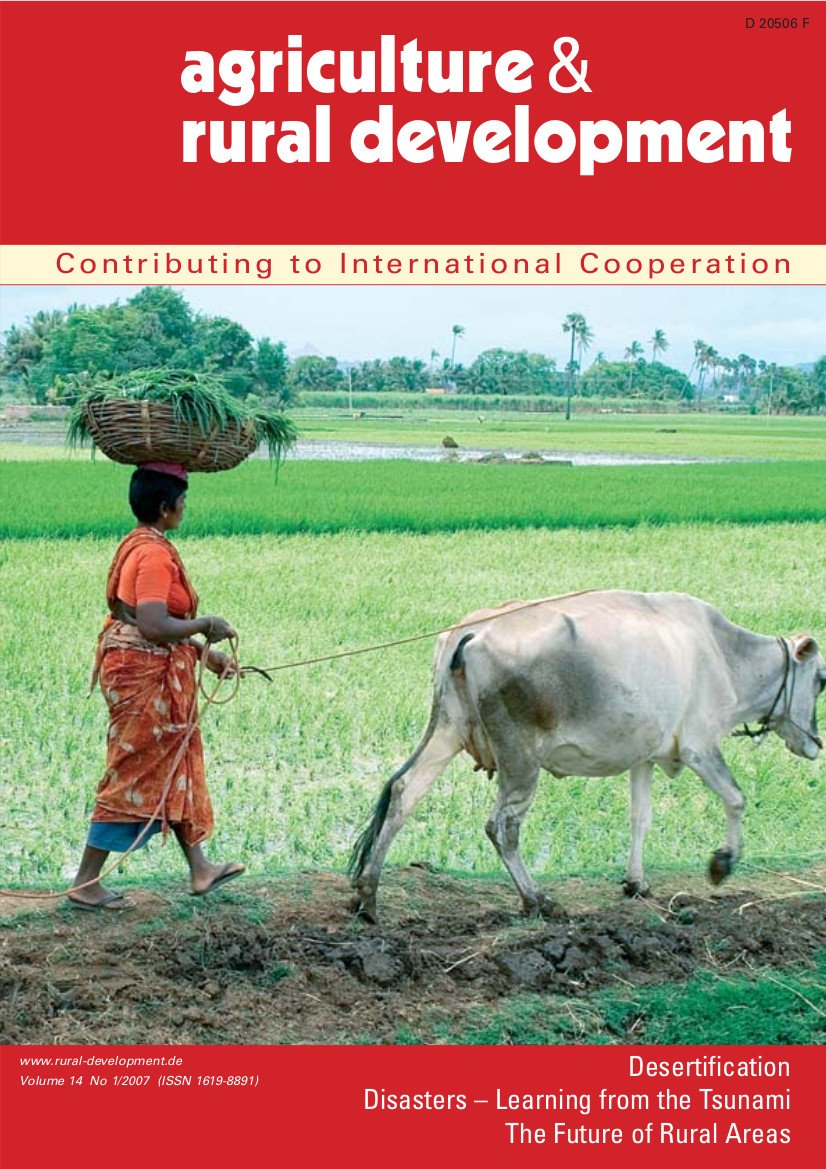Location
The international journal Rural 21 has dedicated more than 40 years to all topics surrounding rural development. Its ambition is to further those strategies and policies that strengthen rural areas of developing and newly industrialising countries and encourage their implementation. The journal addresses the complete range of relevant themes – from agriculture and fisheries via capacity building and education through to health and social security, energy supply and trade. Center-stage is always devoted to inquiring into how measures and strategies can contribute to global food security and to reducing poverty.
Rural 21 desires to further the dialogue between science and politics, the private sector, civil society and practitioners. Two platforms are designed for this purpose: Rural 21 in print is published four times a year, each issue highlighting a specific focus of rural development – this print edition is read in more than 150 countries. In parallel, Rural 21 online keeps the rural development community up to date on news and events, scientific findings and other print and online publications.
Rural 21 is published by DLG-Verlag GmbH in Frankfurt/Germany. Financial partners are BMZ (German Federal Ministry for Economic Cooperation and Development), GIZ (Deutsche Gesellschaft für Internationale Zusammenarbeit), DLG (German Agricultural Society – Deutsche Landwirtschaft-Gesellschaft), SDC (Swiss Agency for Development and Cooperation) and Helvetas Swiss Intercooperation.
The first issue of Rural 21 dates back to 1968. From 1974 to 2007, the journal was published in three languages entitled "entwicklung & ländlicher raum" / "agriculture & rural development" / "agriculture & développement rural". In 2008, the journal was relaunched as "Rural 21".
Members:
Resources
Displaying 311 - 315 of 319Disaster prevention: Risk awareness is the key
The series of dramatic natural events is never ending. 2005 again illustrated that natural disasters are unavoidable. For disaster prevention systems to function properly, investments in raising risk awareness are key.
The future of rural areas from the German Development Cooperation perspective
Few aspects of development policy are better furnished with empirical evidence than the interplay between support for agriculture in the context of rural development and the reduction of poverty and hunger. It is therefore surprising that German Development Cooperation has today largely disengaged from activities in this area: Despite the evidence that practically nothing is more effective and sustainable than combating poverty where it is most often found, namely in the rural areas of poor countries,we fail to take that route.
Strength in unity- Poverty reduction strategies and the right to food.
A lot is expected of poverty reduction strategies, and high hopes have been placed in the Voluntary Guidelines on the right to food. One question frequently raised is whether it is possible to integrate the right to food into the established instrument of poverty reduction strategies.The present article discusses to what extent the two approaches can mesh to make a significant contribution to hunger reduction.
Millennium Ecosystem Assessment II
- Land and water scarcity as drivers of migration and conflicts?
The Millennium Ecosystem Assessment projects that the intensification of freshwater scarcity in combination with continuous water extraction from delicate dryland ecosystems is likely to exacerbate desertification, thus leading to a downward spiral of ecological deterioration and a precarious depreciation of livelihoods in many developing regions. This in turn can push people to migrate, which can have far reaching implications affecting local, regional, and even global political and economic stability.
The United Nations Convention to Combat Desertification - UNCCD: The Rio conventions' poor little sister.
The United Nations Convention to Combat Desertification (UNCCD) is one of the three conventions agreed at the 1992 Earth Summit in Rio de Janeiro. But from the very outset it has led a marginal existence, because industrialized countries feel far less concerned with desertification than developing countries. Moreover, the Convention?s targets are not binding and are open to a variety of interpretations by the Parties.The conflicting interests of environmental and
development policy are weakening its position further.



